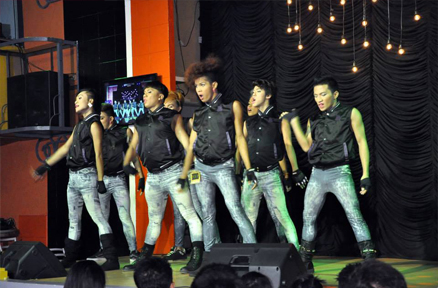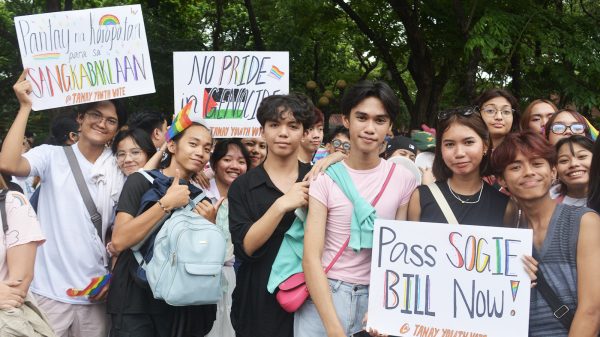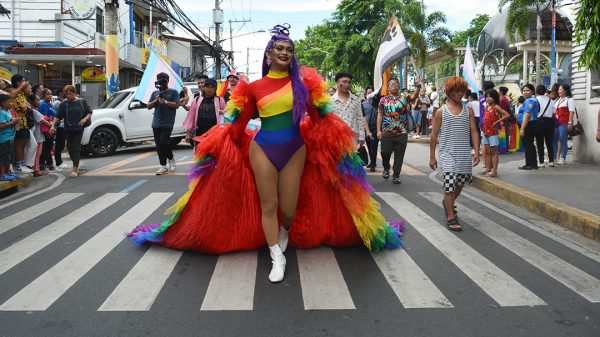They are a group of eight gay men in their early twenties, living in a humble barangay in Las Piñas. At first glance, there’s nothing extraordinary about them. They’re not in a clan or a sorority, but they define their sisterhood like the ones you see in families. And while half of them are unemployed, they don’t fret about it. Although they don’t have regular 9-5 jobs, all eight of them are always busy practicing their complex routines, memorizing steps and mastering how graceful every move should be.
They call themselves the “Goddess of Death”.
 But the people in their barangay call them the “dancing goddesses.”
But the people in their barangay call them the “dancing goddesses.”
“Ang pagsasayaw namin nabuo dahil sa tropa. Nag-decide kami na gumawa ng grupo. Tinawag ko ‘yung grupo na Goddess of Death kasi may ka-grupo kami na ang nickname ay ‘Dyosa’, tapos dinagdagan namin ng ‘of Death’ dahil para sa amin, hangang kaya namin, hangang mamatay kami sa kakasayaw, basta ma-prove namin na kahit bading kami may kaya kaming patunayan, gagawin namin,” said Erich Arcilla, founder and leader of Goddess of Death dance group.
Their group is no different from the ones we see in fiestas and in barangay events. But what makes theirs standout is the way the members present themselves on-stage. “Bading ang mga itsura namin, malalambot; pero kapag sumayaw kami, lalaki ang mga steps namin,” Erich explained.
Instead of doing the expected effeminate type of dancing, they focused and mastered the art of hip-hop dance, and every time they perform at any event, the audiences are left with amazement and shock.
The goddesses are not as privileged as other dance groups – they don’t have a decent place where to practice, and most of the time they can be seen rehearsing in the streets. At times, they don’t even get to finish their rehearsals because the barangay tanods or the homeowners ask them to leave the area.
“Isa sa mahirap para sa amin ay ‘yung wala kaming mahanap na lugar para makapag-practice. Hindi naman namin afford mag-rent ng studio. Minsan, kapag nasa kalagitnaan kami ng pagsasayaw, pinapaalis kami kasi daw maingay kami at hindi daw pwede doon,” Erich said.
But this doesn’t stop them from doing what they love doing. They still train every day, from afternoon to evening.
“Noong unang contest na sinalihan namin, hindi kami nanalo, pero maganda ang feedback nila. Kapag tinuloy daw namin, may patutunguhan kami, kaya sinubukan namin ituloy-tuloy,” Erich said.
There was a time when they needed to focus on their dancing, so the members who had regular jobs had to leave their jobs and devote their entire time in the group. “Kahit mas malaki and kita sa parlor, aanuhin mo naman ‘yun kung wala naman ‘yung mga kaibigan mo, at ‘yung totoong kaligayahan mo?” Johnrey Articula, one of the Goddesses, said.
All their hard work paid off. They won almost all the contests that they joined. They even managed to dance for several rounds in the TV show “It’s Showtime”.
“Ang pagsasayaw namin ay para mabago ang image namin na hindi lang kami basta mga bakla na tumatambay lang sa kalye, na baklang salot sa lipunan. May mga talento kami na binigay ng Poong Maykapal, na shino-showcase namin sa kanila,” Erich proudly said. “Masaya din ang feeling, kasi kapag natapos mo ‘yung sayaw, parang mission . Tapos nakapagbigay pa kami ng saya sa tao. Ang sarap sarap sa pakiramdam kapag pinapalakpakan ka.”
At times, winning becomes a must. “Importante na manalo kami kasi kapag natalo kami, nandiyan ‘yung kukutyain kami, sasabihin nila, sumali pa kayo eh matatalo din naman kayo.”
But their biggest accomplishment (yet) was when the “World Supremacy Battlegrounds”, a dance contest in Australia, chose their group to represent the Philippines last December 2013. The Goddess of Death was the first all-gay group chosen to represent the country in such a prestigious international dance contest. Being chosen was in itself an honor, but being able to go could have been a historic event for the local LGBTQ community.
However, “sobrang laki ng pera na gagastusin para makapunta sa Australia. Kailangan namin ng almost half a million para sa processing ng visa namin, sa pocket money, at sa iba pang gagastusin doon,” Erich explained. “Hindi kami mga anak mayaman, mga mahihirap lang kami. Kapag nananalo kami, ‘yung premyong nakukuha namin, malaki na ang natutulong sa amin.”
They joined all the contests that came along their way. They borrowed money from everyone they knew. But when they finally reached the needed amount, it was already too late. They were not able to fly to Australia.
“Nanghihinayang kami, pero wala kaming magagawa, kasi wala naman kaming pera. Sinubukan namin humingi ng tulong sa barangay pero deadma lang sila. Kahit gusto kaming suportahan ng pamilya namin, hindi naman enough,” Erich said.
 They dwell on the idea that if only the government has existing programs to support these kinds of endeavors, the Goddesses could have joined the World Supremacy Battlegrounds, becoming the first all-gay dance group to represent the country in an international event. The sad truth, however, is that the betterment and welfare of the LGBTQs in the country remains not prioritized by the government.
They dwell on the idea that if only the government has existing programs to support these kinds of endeavors, the Goddesses could have joined the World Supremacy Battlegrounds, becoming the first all-gay dance group to represent the country in an international event. The sad truth, however, is that the betterment and welfare of the LGBTQs in the country remains not prioritized by the government.
Today, the goddesses still continue to join all the dance contests that come along their way. Some of the members teach dance lessons in schools to have extra income. They are also saving up so they can join another international contest in October, and they are hoping that this time, they will have enough money.
“Hindi lang siya grupo ng pagsasayaw, pamilya na ang tingin namin sa isa’t-isa. Magsasayaw kami hangga’t kaya namin sumayaw, hangga’t hindi pa sumusuko ang katawan namin,” Erich said.
Once there were dancing goddesses, they continue to make a mark on their barangay, eventually making a mark on the LGBTQ community. Although the available resources are scarce, it doesn’t stop them from reaching their dreams. Their dancing is not only for themselves or solely for the money, it is also changing the image of the LGBTQ community.
For additional information or for those who want to donate to the Goddess of Death, email crucialchicc.erich@yahoo.com.ph or visit the group’s Facebook page.



























































